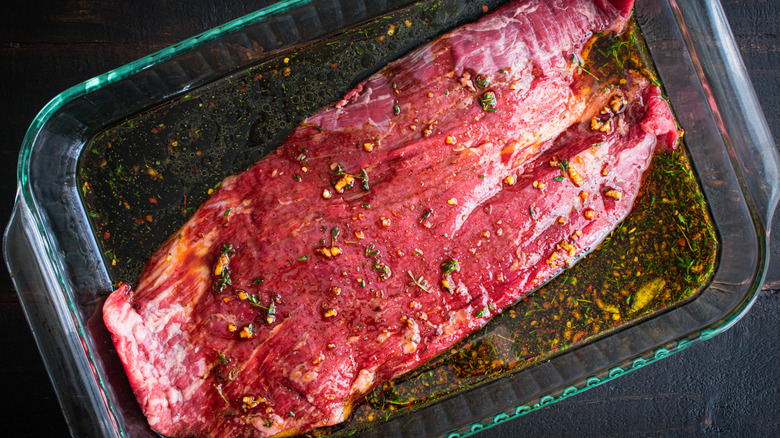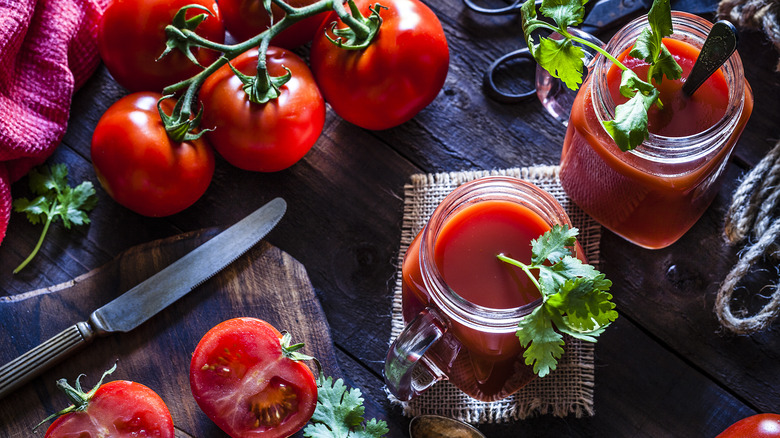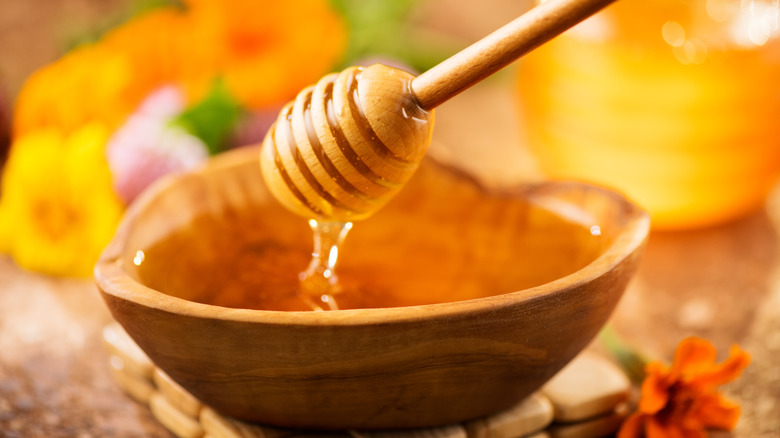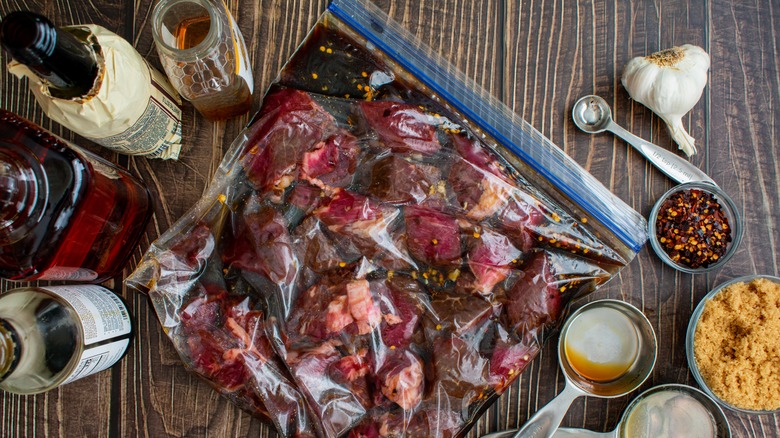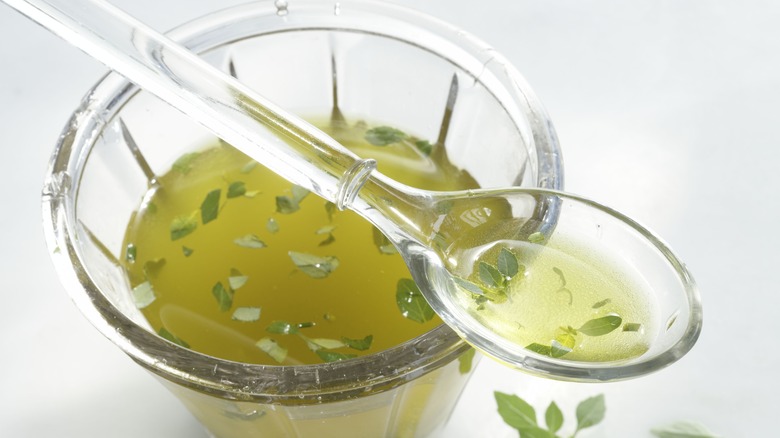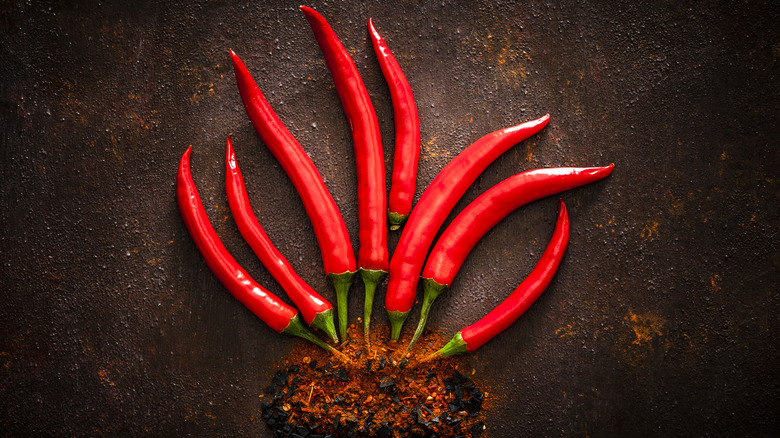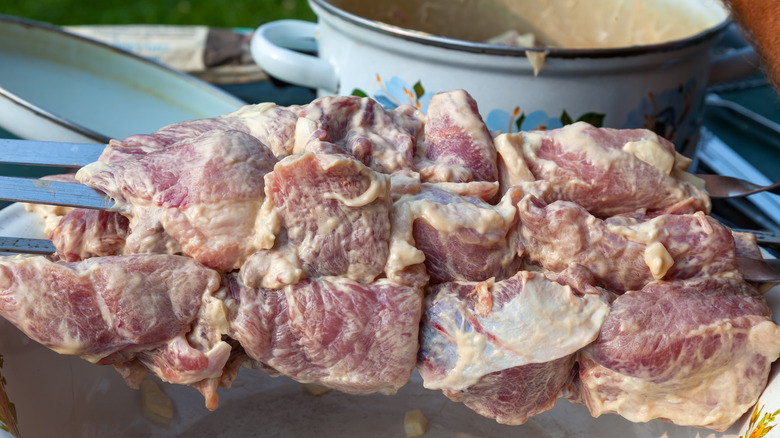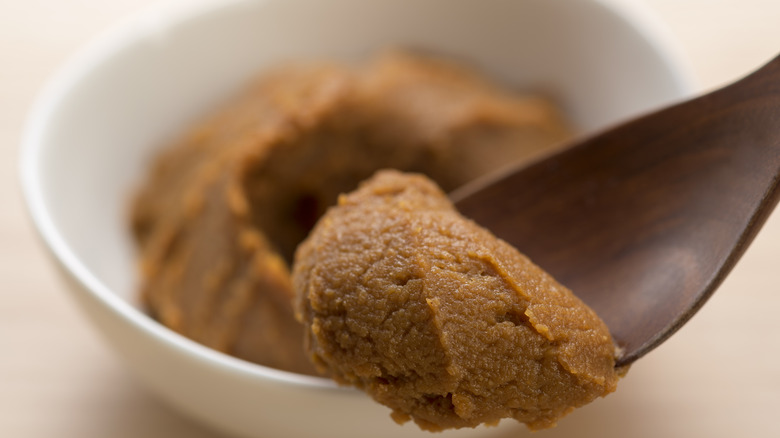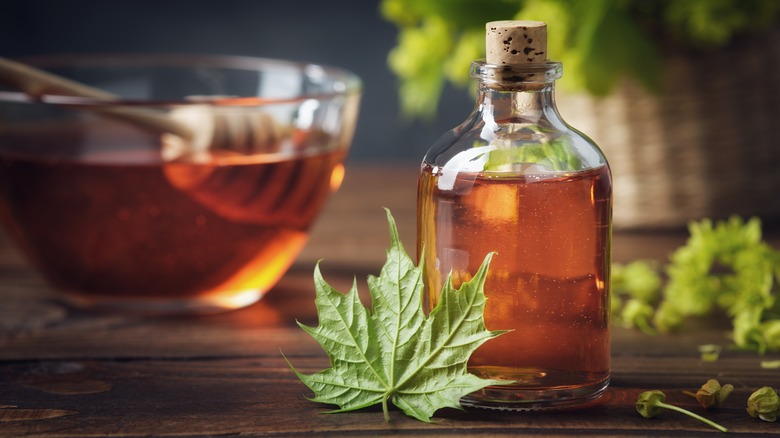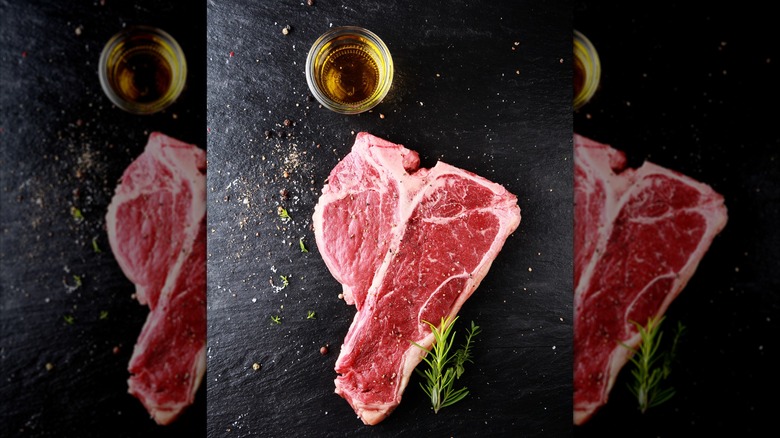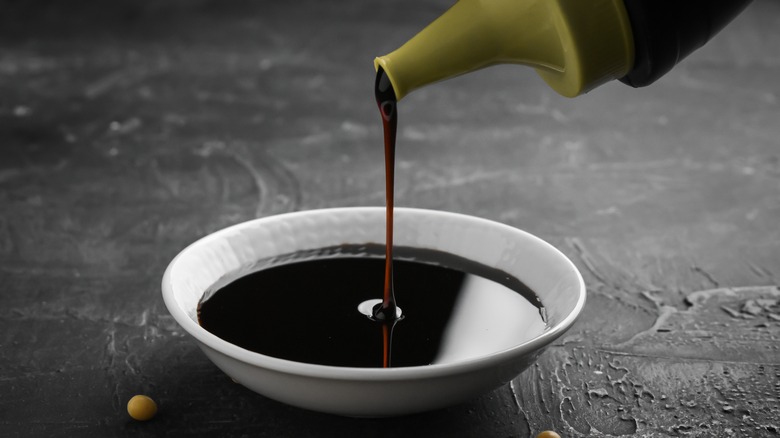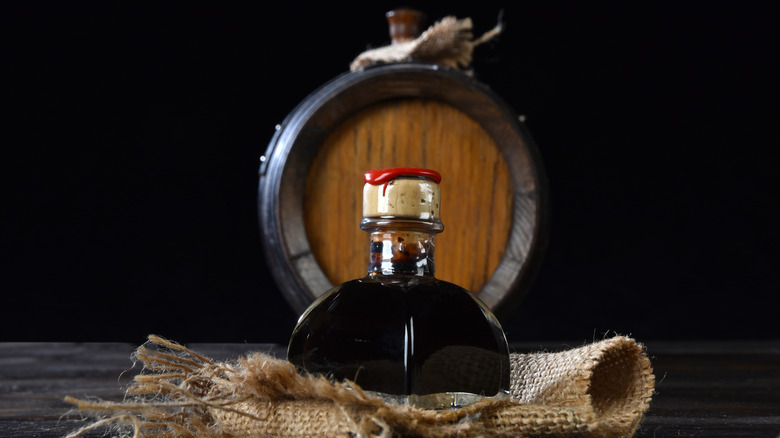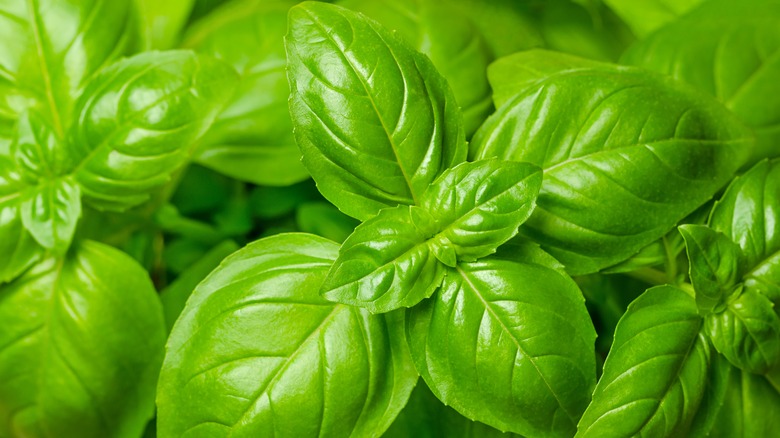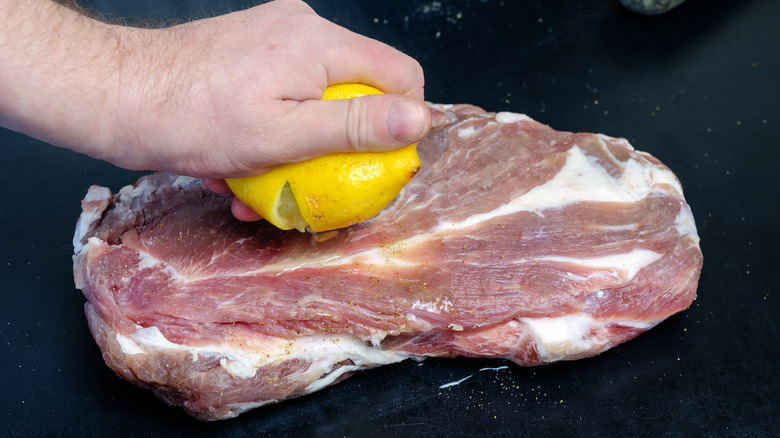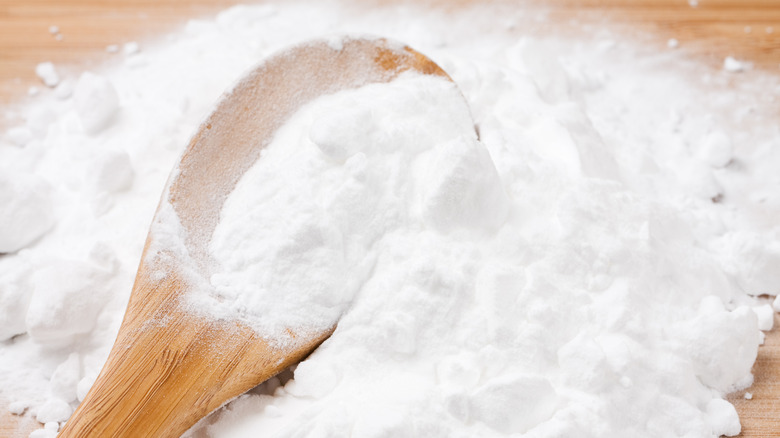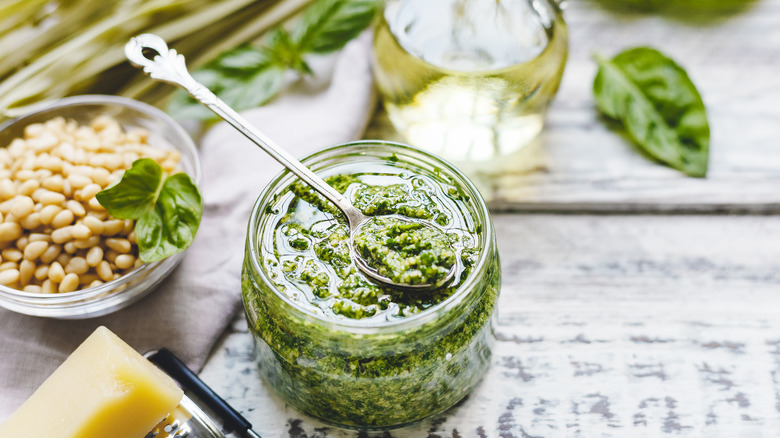17 Ingredients That Will Give Your Steak Marinade A Flavor Boost
Marinating a steak for hours can help infuse it with a whole different flavor profile, or simply emphasize the existing qualities of the meat, making the cooking process simpler and easier while delivering a tastier finished cut. It can also help tenderize more affordable, yet slightly tougher cuts of meat, so a restaurant-quality steak dinner can be served at home without breaking the bank.
For those who have the time and patience, there are wonderful mixtures that meat can soak in overnight, for optimal deliciousness and tenderness. For those in a rush, there are quick 15 to 30-minute marinades that can be whipped up in just a couple of minutes.
Which marinade is right for which situation? They all require a certain combination of acid, oil, and a flavoring agent, but there are many variations available, and experimentation is encouraged. With certain marinade ingredients, a marinade can be made spicy, subtle, Mediterranean or Asian-inspired, or anything else. Check out some key ingredients below just waiting to be harnessed, each a flavor booster for steak marinades.
Tomato juice
The acidity of tomato juice creates a welcome addition to any marinade, helping tenderize the meat while it's soaking in the mixture. Those who want to go an extra step and do a bloody mary-like marinade can replicate some of the spicy, salty, and tangy flavors in the drink by mixing together lemon juice, tomato juice, Worcestershire sauce, pepper and celery salt. Let the steak marinate in it for a few hours; those who like their food on the spicier side might want to add some Tabasco sauce as well.
Experiment further by adding various vegetable powders and seasonings, like garlic and onion powder. Consider topping off the marinade with vodka for a true bloody mary concoction; the alcohol can help soften up the steak even more.
Honey
One of the most difficult struggles chefs grapple with when cooking steak is the loss of the meat's juices during the cooking process, threatening to result in a chewy, less flavorful end product. But some marinade ingredients can help solve this problem, with one of the best contenders being honey, an inexpensive ingredient that significantly improves marinades.
Thanks to honey's unique properties, when it comes into contact with moisture, it helps lock juices into a steak being cooked. This results in succulent, juicy beef that is easy to eat. Honey's stickiness also helps hold complementary spices in the steak marinade, and tends to yield a slight caramelization. As a result, honey-infused marinades give steak a thin, sweet, crust-like structure that beautifully frames the beef.
Worcestershire sauce
One simple explanation for why Worcestershire sauce is such a popular ingredient for steak marinades is that it's a combination of several ingredients in one. A traditional English sauce combining white vinegar, molasses, onions, garlic, tamarind extract, sugar, anchovies, and chili pepper extract, Worcestershire sauce brings a mix of flavors to the table, simultaneously harnessing sweet, salty, and umami tastes.
Pour this one-stop-shop all over raw steak, seal it in a Ziploc bag or let it rest in a bowl for 30 minutes to two hours, and it's time to start cooking. Things like olive oil or lemon juice could be mixed in as well, but because Worcestershire contains so many flavors, it's usually wise to not add too many additional ingredients.
Salmoriglio
Salmoriglio is a steak marinade typically made at home by utilizing a combination of olive oil, oregano, lemon juice, salt, and water (if desired). The best advice for putting together a great salmoriglio is to make sure the freshest, highest quality ingredients are being used. Though it frequently adorns fish in Italian and Greek cuisine, it can also be a great addition to meat, as it helps break down tough cuts like hanger or flank steak.
The ratio of olive oil to lemon juice should generally be two parts to one. This combination of oil and acid helps tenderize the steak while also infusing it with subtle Mediterranean flavors that bless meat with a unique flavor profile, all without overpowering the cut's natural flavor.
Cayenne pepper
Though most marinades are intended to emphasize the natural flavor of steaks and make them more tender, ingredient manipulation can also help alter the steak's flavor profile in and of itself. Meat eaters who love a touch of spice might want to add a dash of cayenne pepper, for instance, letting the marinade soak the steak for a few hours before cooking.
If working with a cut of steak that might be light on flavor, cayenne is a particularly great candidate to add to the mix. Start the experimentation with just a pinch of this potent flavor booster, then gradually progress to a higher amount of spice to make sure it doesn't overwhelm the flavors, but instead wield just enough potency to complement them.
Coca-Cola
Yes, even Coca-Cola can be used to marinate a steak. It's also an ingredient many people have in their kitchen, or at the very least, can be secured inexpensively at the nearest corner store.
Coke combines high amounts of sugar with acid. This acidity, almost as high as that of lemon juice, helps break down tough steak cuts, and the soda's high sugar content results in a nice caramelized crust when the steak cooks. For such reasons, Coca-Cola makes a great ingredient to marinades intended for less tender cuts of meat, like an affordable skirt steak. Marinate the meat for as little as 30 minutes, or let the steak rest in the soda mixture for a couple of hours to further tenderize the meat.
Mayonnaise
Those who prefer their steak with a flavorful crust and a nice char should consider mayonnaise. It might seem unusual, and doesn't feel like something that belongs on steak, but it can make flavors soar. The everyday condiment is used to tenderize a lot of meat, but mixing it with a dry rub helps seal in juices and hold tight to spices and seasonings throughout the cooking process.
For ideas on what spices to use in a mayo marinade, look to cumin, garlic powder, chile powder, paprika, garlic, or thyme. In addition, mayonnaise doesn't have to be the only sauce in play. Feel free to add liquid ingredients like Worcestershire or soy sauce. This marinade can be used with pretty much any cut or kind of meat.
Miso
Some people skip marinating their steak because by the time they get around to cooking, they're already hungry and in a hurry. For those who don't have the patience for an overnight marinade, one of the fastest options has to be the miso mix. Besides infusing a steak dinner with some delicious Asian flavors, the meat only need to marinate in it for as little as 15 minutes, and the miso's strong flavor will have enough time to make a dent.
For those eager to combine additional staples of Asian cuisine into their marinade, leaning even further into that flavor profile, mix in varying amounts of soy sauce, toasted sesame oil, rice vinegar, and perhaps even some grated ginger. It will really make your meat stand out.
Maple syrup
Much like honey, maple syrup has properties that make it a great addition to any steak marinade; it locks in the meat's juices and results in a nice, thin, caramelized crust. Add in things like pineapple juice, Dijon mustard and bourbon to create a wide variety of delicious marinades.
Use maple syrup to marinade either tender cuts of steak (like sirloin) or smaller chunks (like steak tips). Seal the meat in a Ziploc bag with the marinade, then let it rest in the refrigerator for at least an hour, but optimally a few or even overnight.
One quirk of a maple syrup-based marinade is that it should be re-introduced in the actual cooking of the meat. While searing in a pan, baste the meat in the marinade frequently, preserving the flavor as its cooking.
Bourbon
Though it can be used in a marinade with maple syrup, bourbon also works in a variety of mixes in order to help tenderize a cut of meat and increase flavor. It's one of the best kinds of alcohol to use, as it helps break down the steak's enzymes. This not only softens the steak, making it easier to eat, but it also allows the other ingredients of the marinade to soak into the meat more efficiently, infusing their own unique flavors into the resulting dish.
For a simple bourbon marinade, mix it with ingredients like brown sugar, olive oil, Worcestershire sauce, or additional seasonings and spices on the simpler side. Let the meat soak in it for a couple of hours, and mouths will be watering by the time it's on the grill.
Soy sauce
The best thing about soy sauce is that it tenderizes the meat at a very rapid pace; soak the meat in there for as little as 30 minutes and it will still have a noticeable, delicious impact on the final meal.
Soy sauce is a common, essential ingredient in Asian-inspired recipes all over the world, but thanks to the decadent taste it imbues in steak, it has also become a staple in steak marinades in both professional and home kitchens. That's because in addition to the flavor boost, soy sauce helps break down the steak proteins. Use it to marinate almost any type of meat, as it's a common ingredient employed in the preparation of pork and chicken, as well as a variety of fish (soy-glazed salmon, anyone?).
Balsamic vinegar
How does balsamic vinegar differ from regular vinegar? For starters, it is more delicate, with a mild, sweeter taste; it also has a significantly thicker texture. Nevertheless, it retains the acid of a vinegar, meaning it is still quite effective in tenderizing meat. Balsamic can be turned into a wonderful glaze, so if there's any leftover, it can be used in the cooking process as well.
To make a marinade, pair balsamic vinegar with honey (a must), as well as potential add-ons like soy sauce, olive oil, Worcestershire sauce, and minced garlic. The reason honey and balsamic pair so well is because the sweetness of the honey and the mild acidity of the balsamic vinegar complement each other, and their textures help create quick a thick, syrupy marinade.
Basil
There's nearly no circumstance in which basil is frowned upon when it comes to cooking, and this extends to marinating steaks. Adding basil and garlic to a steak marinade results in a wonderful combination, mixing the sweet, aromatic qualities of the basil with the sharp taste of garlic to create an ultimately sweet, tangy, herbal flavor.
Use dried or chopped up fresh basil, mixing with classics like Worcestershire or lemon juice. A little spice helps balance out the flavor profile, so feel free to add a pinch of black pepper. Those yearning for a Mediterranean flavor profile might want to consider adding basil to a tomato juice or salmoriglio marinade; use Thai basil, which has a licorice and anise taste, in Asian-inspired marinades.
Lemon juice
One of the most basic marinade ingredients, used in almost every recipe, is lemon juice. The reason is simple: It lends a citrusy, tangy taste to most cuts of meat, and the high acidity of the lemon juice helps break down the proteins. Since the most flavorful cuts of steak also tend to be the toughest, those hoping to cook something chewier like a skirt steak will fin that lemon juice will make it more tender, allowing other flavors in the marinade to become better infused.
For a quick and easy marinade, mix lemon juice with vinegar and soy sauce. Then let the steak (or really, any cut of meat) marinate in this combination for an hour or two, and it will significantly change the composition of the meat for the better.
Red wine
Unlike most possibilities, a red wine marinade is best cooked for a bit before being combined with the meat. Throw it in a pan with smashed garlic cloves, sugar, kosher salt, paprika, thyme, and any other spices or herbs (some add ingredients like star anise and cinnamon as well). Cook it for about five minutes, until a fragrant aroma comes off the pan. Cool and then mix with meat in a sealed bag.
Inspired by the ingredients used in coq au vin chicken, a red wine and garlic marinade combines acidity and the deep, complex flavors of a given wine to add dimensions to the steak's taste. For this particular marinade, it's best to let the steak soak overnight, to fully absorb all the various notes of the wine. Before cooking it the next day, be sure to dry it well.
Baking soda
This baking ingredient probably isn't the first thing that comes to mind when thinking of meat preparation. But baking soda can function as a great brine to quickly tenderize steak, particularly for those cooking chunks of meat like steak tips.
To make the brine, combine baking soda with ¼ cup of water and mix together in a bowl. When placing the meat in the bowl, don't simply put it in; instead, make mix so that the brine fully covers each piece of meat. Cover the bowl with Saran wrap and leave in the fridge at least 30 minutes, or up to two hours. Try to avoid leaving it in for more time than that, as that can alter the flavor and texture of the meat in unappetizing ways.
Pesto sauce
Pesto sauce purchased from a store is fine, but for those who have the time and ingredients, pesto made from scratch is best for marinades. Though typically employed to marinate pork and chicken, pesto sauce can lend a great Italian-inspired flavor to steak as well.
To make the pesto, simply toast some pine nuts, then combine them with fresh basil, lemon juice and zest, olive oil, minced garlic, salt, and capers. Blend the ingredients together very well, preferably in a food processor, to create a classic smooth pesto texture. Chunky pesto is less effective at being brushed onto the steak. Also try soaking the meat itself in pesto in a sealed plastic bag, which gives the finished product an even stronger Italian flavor.
